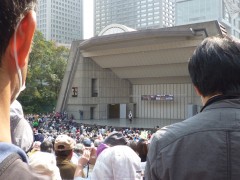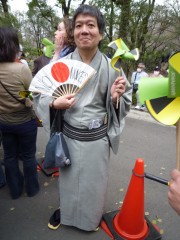15 April 2013
My comment on NBC News article on Okinawa issue
I posted the below comment on the NBC news article,
In Okinawa, the war isn't over: Protests aimed at new US base
-

-
!
![]() #99 - Mon Apr 15, 2013 8:46 AM EDT
#99 - Mon Apr 15, 2013 8:46 AM EDT
22:24 Posted in Media, Politics, US-Japan relationship | Permalink | Comments (0) | Tags: okinawa, military
10 March 2013
Real Patriots MUST oppose nuclear energy
2 year on after 311 Fukushima nuclear disastor along with the earthquake and tsunami.
In Tokyo, on 10 of March Sunday, tens of thousands of people gathered in Hibiya Park located near the parliament and government buildings and then marched on streets calling for halt of re-operation of any more nuke plants. Now only 2 of 50 plants are operated since all the plants were shut down last May.
As Patriot, I joined the march to show my will of no-nuclear policy.
Nuclear energy is no longer efficient considering cost of safety measures and wastes disposal. Nuclear generation does cause severe accident, which no nation can perfectly prevent. It did happen like in Chernobyl and Fukushima and it will in future.
Surely we have to think alternative but nuke generation is no longer a choice for us.
Because I love my country, its land and its people. I can never let nukes pollute our land and people any more. I can never let my beloved nation depend on such inefficient and dangerous energy.
That is what a real patriot think. I wish other people in the world follow suit. Be patriot for your country and society.
23:05 Posted in Japan News, Politics, Science, Tokyo Life | Permalink | Comments (0) | Tags: nuclear power, kimono
01 March 2013
"Les Miserables" Life is in hell
I went to the cinema last night. It was a late show that starts 9 PM.
I was not particulary interested in the story of the film. I was only interested in music played in the film. One of the songs, I dream a dream, has caused a sensation recently by a British middle aged singer, Susan Boyle.
The story was about a man who escaped from probation and became a burgalar but later turned into an innocent man and tried to save others.
"Les Miserables" means "Poor people" in French. The story took place in an era of post-French revolution civil war in 19th century. People who are desperate, and in despair because of condition they were in.
I just could not get what messages the story delivers to the audience. The story goes on like a revue.
I just guess it tells life is not easy. You can't easily overcome. Even though you are desperate to change the world better, things cannot move as it should.
You should just be patient or keep dreaming. Dreams that never come true.
Does it mean we all live in hell and be as we are?
Yes, we are all "Les Miserables."
31 December 2012
Americans as oppressors to Japanese
18:03 Posted in Japan News, Politics, US-Japan relationship, USA issues | Permalink | Comments (0) | Tags: military, nuclear aircraft carrier, okinawa








As a Japanese citizen living in Tokyo, in response to the above comments, I would like to make the below comments.
1. Japan including Okinawa surrendered to the Allied force unconditionally, therefore Japan and Okinawa should endure current situation?
Japan regained independence 61 years ago, both nations signed the treaty to recognize each other's sovereignty. That means the U.S. should treat Japan as independent nation. Who lost or won was officially resolved by that treaty. Of course emotional issues are other things.
Yes, we did the wrong things. Japan attacked Pearl Harbor and started the stupid war. Even before Pearl Harbor Japan invaded China and mass-murdered innocent civilians there. That is the history just like US overthrew Hawaiian kingdom in 19th century, almost half a century before Pearl Harbor attack. What did native Hawaiians think when Asians attacked white dominated empire's military bases? Interestingly enough, Okinawa used to be independent kingdom which was overthrown by Japan in the same period.
2. Without US military presence, Japan and Okinawa can never defend themselves from China or North Korea?
Japan might not be ready for its own defense. But the problem is the US military no longer functions as defense force. Yes, US-Japan defense treaty is still effective but what would US actually do when some disputes occure is different matters. Can US fight against China over Japan's sovereignty? The US is heavily dependent on China economically. China owns more US treasury bonds than Japan does. China produces many US goods such as iphone and toysrs toys as much as China consumes many US goods such as Boeing and Motorolla.
As for North Korea, their only effective weapons are nuclear missiles. Once they launch missiles, it would reach to Japan within minutes. No way to stop it. Only few of them may be blocked by pac or easis. NK is like suicidal nation. No nuclear deterrence works since they are never afraid of retaliation.
Besides above two issues, the construction of new marine runway in Henoko, near Camp Schwab involves huge environmental issue. The expected construction site is where endangered marine mammals, dugons inhabit. As I remember, US is accusing Japan of whaling in Antarctica.
Plus, more of Japanese learn US is exploiting Japan's tax money and causing troubles although US is no longer reliable force for the defense. We are learning US is spending too much money on military expense while impoverishing its own people. Gap betwen the rich and the poor among Americans is widening. A lot of us say US is no longer role model for us, rather they have become model for "Dont be like them."
I graduated from the university in San Francisco 15 years ago. I have good memories there and still have good image of your people. So I would advise your goverment and military to reconsider what to do about this issue for the benefit of both nations.
If you would like to know more about what is happening in Okinawa, I recommend my blog articles relating to this issue. I visited Okinawa several times since this problem erupted.